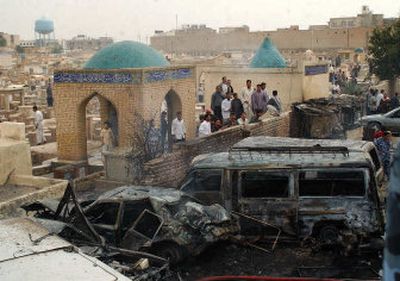Car bomb targets cemetery

NAJAF, Iraq – A car bomb exploded near the gates of the sacred Shiite Muslim cemetery here Thursday, killing at least 12 civilians and injuring dozens in the latest provocative assault on the country’s Shiite majority.
Among the dead and wounded were women and children, coming to visit the graves of relatives at the sprawling cemetery, the most revered in the Shiite faith because it lies next to the shrine of Imam Ali, son-in-law of the prophet Muhammad and the sect’s most venerated figure.
A medical assistant said he saw the bodies of three charred women being brought in by medical workers to the hospital’s morgue, where family members collected the bodies and wept.
“Why? Why?” cried Mohammed Hussein Kadhim, whose 14-year-old nephew Karrar bled to death from shrapnel that lodged in his skull. “What had he seen of life?”
The bombing came amid heightened political tensions over stalled talks to form a new Iraqi government. Sunni Arab, Kurdish and Shiite factions have blocked attempts by interim Prime Minister Ibrahim al-Jaafari to retain his post for a four-year term. U.S. and Iraqi officials as well as ordinary citizens have decried the months-long parliamentary stalemate.
Al-Jaafari, who has resisted calls to step aside, said Thursday at a news conference that he would do so if the parliament formally rejected his ministerial nominations. But a news conference scheduled to announce the next parliamentary session was canceled as the country enters a four-day holiday.
The lingering impasse and daily eruptions of sectarian violence have also dogged President Bush, under increasing pressure to draw down troops in Iraq. Bush, speaking to an audience of college students in Charlotte, N.C., said that newly elected officials in Baghdad must “get moving” to live up to the Iraqi public’s expectations for democracy.
“Part of the process now is to say to the Iraqi leaders: ‘People said something. Now you need to act,’ ” Bush said. “The people want there to be a democracy, and it requires leadership, for people to stand up and take the lead.”
Scott McClellan, the White House spokesman, said the president felt it was particularly important to get a new government in place because the recent outbreak in sectarian violence, triggered by last month’s bombing of a Shiite shrine in the central Iraqi town of Samarra.
“There is a political vacuum that needs to be filled,” McClellan said.
The deadlock has already broadened a political and security vacuum exploited by Sunni insurgents and Shiite militias.
Police in Najaf said the car packed with explosives managed to evade several checkpoints and find its way to the crumbling Old City surrounding the shrine used to stage funeral processions.
Witnesses said the area become engulfed in fire, smoke and blood.
The 1:15 p.m. explosion was the latest in a series of attacks on sensitive Shiite religious sites by insurgents seemingly determined to spark a full-scale civil war. The Feb. 22 destruction of a revered shrine in Samarra sparked a torrent of reprisal killings by Shiite militiamen against Sunnis.